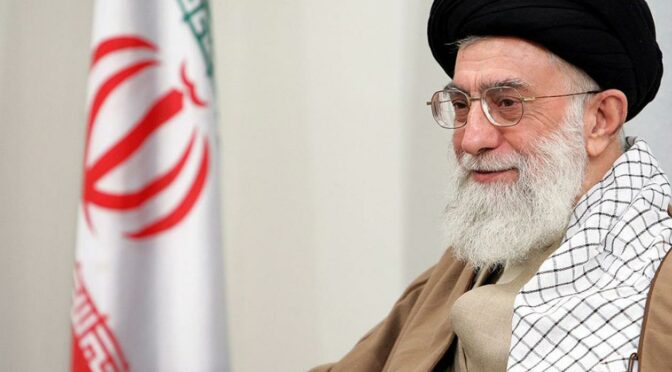The ayatollahs have no compunction supporting both sides in conflicts if it’s in their interest
In an article this week on the dangers to the UK of Islamist extremism, David Cameron suggested that Britain could work with Iran to combat the Islamic State’s offensive against Iraq. This is a dangerous and misguided proposal.
The idea that Iran and the West have mutual interests in Iraq is not new. It was suggested in the early 2000s — but lethally discredited when we discovered that the Revolutionary Guard, a central instrument of the Iranian state, together with its terrorist proxies Lebanese Hezbollah, was training, equipping and directing Shia militias to kill British and American soldiers in Iraq in their hundreds.
Likewise in Afghanistan, though on a smaller scale. Since 2006 at least, the Revolutionary Guardhas been supplying the Taliban and other insurgents with weapons and ammunition to attack British, American and Afghan targets, as well as supplying, funding and running training camps in Iran for Afghan jihadists.
Is there no contradiction, then, in a fanatically Shia Iranian regime supporting Sunni Taliban fighters? Anyone who believes that, fails to understand the cynical pragmatism of Iran’s rulers.
An active al-Qaeda network — also of course Sunni — operates today in Iran with the full knowledge and support of the regime. Led by the Syrian-born Yasin al-Suri, this network organises the movement of al-Qaeda terrorists, documentation and funding, from and through Iran to Pakistan, Afghanistan and the West. Recent terrorist plots in Europe, the United States, Canada and against Western targets in Egypt have been linked to Suri’s Iran-based cells. Links have also been identified between this al-Qaeda network in Iran and the 7/7 bombings in London as well as a planned attack against Heathrow in 2006. Suri’s group also supports the al-Qaeda al-Nusrah Front in Syria by helping to transfer funds from donors in the Gulf and Kuwait. That’s right — the same al-Nusrah terrorists that are fighting against Iran-supported Bashar al-Assad, the Iran-sponsored Hezbollah and even Iran’s own Revolutionary Guard.
Closer to home, al-Qaeda in Iraq, now known as the Islamic State, has benefited not only from Suri’s network but also from funding and weaponry supplied by the Iranian ministry of intelligence and security. There is every likelihood that this support continues today, even as Iranian forces aid opposing Shia militia groups in Iraq, and engage in battle against the Islamic State itself.
Iran’s habitual double-dealing has multiple purposes. The first is defensive. Instability among their neighbours, especially Iraq, is an important means of reducing any threat they may present. Tehran also uses rival factions to achieve specific military objectives. For example, strengthening one group of insurgents while undermining another has helped to weaken opposition to Assad and buttress his position.
The ayatollahs, therefore, seek to use both Sunni and Shia insurgents as a means of strategic influence and control throughout the Middle East in pursuit of Iranian hegemony. And of course Tehran will miss no opportunity to damage and weaken the United States and its allies.
The question remains: are the immense risks of co-operating with this regime worth it for the damage that might be jointly inflicted on the Islamic State? In reality, especially as Mr Cameron has ruled out significant military engagement, Britain’s effect can only be very limited at best; and more likely, irrelevant.
Iranian forces, more sophisticated than the Islamic State’s and unencumbered by Western restraint and timidity in the face of unbridled brutality, are capable of achieving what we could not. What Tehran wants to achieve in Iraq, however, is entirely unknown to us.
Would Iran be interested in co-operating with Britain and the Americans? My guess is yes, although privately. With customary guile, it would use co-operation as a trap — to weaken us and, more importantly, to strengthen its bargaining position in the nuclear negotiations set to resume next month. Iran’s objective is to achieve a deal that will relieve crippling Western sanctions and leave it with unencumbered nuclear potential.
Mr Cameron can be certain that any collaboration with Iran will only be in Tehran’s interests. He should abandon any idea of co-operation and vigorously resist any deal that leaves Iran with the potential to continue developing a nuclear weapons programme. Otherwise we will end up with a nuclear-armed terrorist state that cannot be trusted to restrain itself from using its new-found power or to spread nuclear material among its favoured proxies.
Article published in The Times, 18 August 2014. © Richard Kemp

